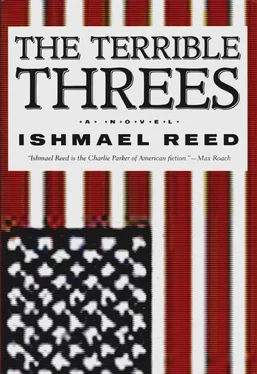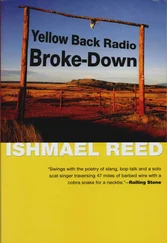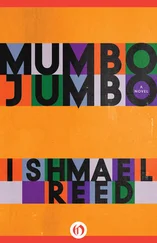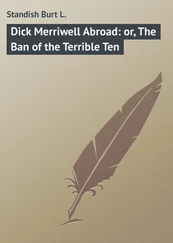Her face was puffy and red. Her blue-tinted hair was becoming unglued. Her round, soft stomach felt like Beirut, Lebanon. The feminists, her former allies, had especially given her a hard time when she announced her support for the Conversion Bill; she said that those who did not pledge allegiance to Reverend Jones’s brand of Christianity should be deported.
Why did women hate her so? Why couldn’t they understand that the 90s demanded responsible feminism? One that had serious issues to deal with, one that had gone beyond bra burning, sexual preference, and abortion on demand. She had to show that she could take it like a man. Could support tradition and values. That it wasn’t like the old days when they were in the Village. Times were more complicated. And what was wrong with a Christian country? Reverend Jones’s ideas were a little bit bizarre, but somebody had to stand up against the excesses of the last thirty years.
The maid peeked into the bedroom where Nola lay stretched out on her big bed. Sometimes the maid would find fifteen or sixteen whiskey bottles underneath her bed, or in the closet.
“Your Honor,” the maid said.
“Yes, what is it, Maria?”
“Would you like something before I go, Señora?”
“No, Maria, I think that I’ll just get some sleep.”
“Those women treated you awful, Madame. I saw it on television. All of that pushing and shoving. It’s amazing that you were not hurt, Madame.”
“Thanks, Maria.” The woman started out the door. “You have plans for this evening?” Nola asked.
“We’re having a Xmas party, just members of my family.”
“That must be nice.”
“Yes, Señora. I must go now. Merry Xmas, Señora.”
“Merry Xmas, Maria.”
She went to sleep. It began to rain. Shango hammered the sky. She awoke about one a.m. and put her hand on the table. Someone was calling her name. Nooolllaaa. Nooolllaaa. The French doors to the bedroom swung open. She could see the lights of Washington in the distance. She sat up. She went to close the French doors. She hated being all alone in the house. At fifty she was still young, and some men found her attractive when she was sober, but there was no time for dates. She was all work. She drove her law clerks seven days a week, and since she had become Chief Justice, she worked even harder. She was in her bed alright, but it seemed to be suspended. She wasn’t alone in the room. “Who’s there,” she called. She could make out a man in black robes. His back was turned to her. She could make out some of the words he was saying. “Yet fear, still more, the still fearful doom / That takes the richest of heaven’s slighted gifts / And leaves thy body and thy soul in darkness / To roam the earth a senseless corpse, or gives thee / Before thy time, to the tormenting fiends / Such was my crime — with life, health, reason blest / And heart with rapture glowing, I looked round / Such was my punishment; the beam from heaven / That pours its light into the mind of man / Was suddenly extinguished, and a shroud / Darker than that of death, enveloped all / Within me and around me. In this gloom / Peopled with specters, filled with scenes terrific / How long I lived — of the dread agony / Could life be called — I know not. To the dead / and the condemned. Time measures not his steps / And every moment seems eternity.”
The poor man turned to her. She started to scream but the specter seemed harmless. It was shimmering in a pale green light. She could identify his face, wrinkled, gaunt and crawling with maggots. There was a huge hickey located above his eye. He wore a wig which had become the home for many insects. It was Judge Taney, the man who had been a Supreme Court justice when Dred Scott came before the court, in 1857. The case of Sullivan vs. Scott where a slave sued his master for freedom after the master transported him into a free territory.
“I could have had that beam of light, Nola Payne,” Taney said. “I had the education: Greek, Latin, standards, tradition were all mine. I was in the right social class and had all of the breaks, but I met my match when Dred Scott came before me; he had something that I didn’t have. A slave as lowly as he was. I had such a contempt for the African. I said that he had no rights that a white man was bound to respect, and when he came into the courtroom, I couldn’t take my eyes off him. What dignity.
“O, if only they had had black studies in my time. If only I had become acquainted with Ivan Van Sertima, if only I could have spent some time at the feet of James Spady instead of in those schools where I was taught that the white man was the center of the universe and that women and blacks were put here to be their slaves. Scott had courage, but I made the wrong decision. A decision etched forever in the annals of law, and I am condemned to wander around the American hell discarded by history like the Spruce Goose, my name spoken with disgust. Bewarrreee, Nola Payne. Beewarreee. This Reverend Jones is a dangerous man, and the Conversion Bill is bad news. Why, if the Jews and blacks are thrown out of the country, it will become dull and phlegmatic, like Canada. And so I’m condemned to wander eternity, reciting my brother-in-law Francis Scott Key’s awful poetry. Would you like to hear the choruses that were omitted from ‘The Star-Spangled Banner’?”
“That won’t be necessary, Chief Justice Taney.” Nola turned to the voice that was standing at the threshold of the garden. There attired in priestly clothes was Nick.
“Who are you?” she asked.
“Nicholas of Bara,” Nick said. “Chief Justice Taney is giving you good advice.”
“But they all said that Clift was making it up.”
“They were wrong.”
“It is you, isn’t it?” Nola said, now sitting up in her bed.
“It’s me. Clift was right. He did the right thing. You do the right thing, or you, too, will become like Taney. A man brought to disgrace by vanity.” Nola Payne began to sob. And when she awoke the next morning, the sun was so bright that it burnt through her eyes, and it was only eight a.m. It would be a beautiful Xmas day. She called the justices into special session. She rose and went into the bathroom and removed the pills from their cabinets and watched as they went down the toilet. She went into the library and took all of the whiskey out and poured it down the sink. She took a bath and thought for a long time. She knew what she had to do, after Roger Taney’s pitiful narration of his infamous role in the Dred Scott decision. She prepared her own breakfast and ate in the garden. She walked down the stairs and got into her limousine. Her chauffeur was shocked. This was the first time in five years that he didn’t have to help her down the stairs, as she was recovering from a drunken stupor. She arranged for a special session of the Court. She went to the Court and cast votes that would shake Jesse Hatch’s administration to its foundation. She wrote the majority opinions for the vote against the Conversion Bill and for overruling a lower court by handing the reins of power to Dean Clift, who had been wrongfully removed from office by the Hatch administration.
As soon as it was heard that Nola Payne had cast the vote, restoring Clift to the Presidency and striking down the Conversion Bill, anybody who had anything to do with the Hatch administration began making travel arrangements. By late afternoon, the White House was almost empty. Committees in both the House and the Senate began announcing investigations into the Terrible Twos — Operation Two Birds — the covert operation that had been begun in the Clift administration. Everybody was abandoning Reverend Jones and going over to Dean Clift. Jesse Hatch had gotten in touch with officials of the returning Clift administration to arrange for the best possible deal that he could get for his role in the Terrible Twos. He didn’t want to do all that much time in Leavenworth. Kingsley Scabb had contacted some of his friends about a lectureship on the role of the Vice President at one of the staid Eastern universities. Nola Payne was being cheered everywhere she went and was being mentioned as a possible candidate for Governor of California, a state that seemed to be created just for her. Reverend Jones was gulping down a lot of pills and drinking water. He turned on the other channel. There was James Way, the hard-boiled conservative columnist, inside his Georgetown home, with homeless people sitting at his table, and welfare children opening their presents underneath his tree. The local TV cameras cornered him in the kitchen, supervising the chefs who were roasting turkeys or roast beef and Yorkshire pudding for all of the surps who were lined up in front of his house. His neighbors had complained, but he paid them no mind. Excerpts from the column that had appeared in the Washington Sun earlier that day told the whole story. “I went to hell and back with Nicholas. He showed me Walter Winchell, who was there for insulting Josephine Baker, and Westbrook Peglar for saying nasty things about Eleanor Roosevelt…. You get nowhere in this world with a nasty temper, and by using invective…. You get nowhere in this world without compassion and mercy,” he had written. The live TV cameras were trained on him as he scooped some potatoes and placed them on the plate of a homeless surp. “Thank you,” the grateful man said. “I use to not be able to get through a column without citing at least three dead men from the canon, but now I’m thinking for myself. I’m tired of being Joe Bob Briggs with a Thesaurus, and I’ve decided to modify my wordy style. I’ve thrown away my Bartlett’s. I feel honest. I feel fresh. And I’m going to quit being the mean and petty little son of a bitch whose whole career was built on baiting black people,” Way told the interviewers at the conclusion of the meal. The homeless surps began to applaud James Way, the columnist. Tears began to stream down his cheeks like Niagara Falls. One of the homeless approached him and put his arms around him. He cried into the man’s chest, reminding one of the photo of Nixon crying into Ike’s chest, after his famous Checkers speech.
Читать дальше












